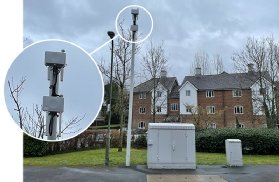
Urupong - stock.adobe.com
Virgin Media O2 boosts mobile coverage in smart pole trial
UK operator claims successful innovation in trial using smart poles installed beside existing on-street broadband cabinets to accelerate mobile network roll-out across the UK by converting cabinets to mobile base stations
Just days after data and digital infrastructure minister Julia Lopez called on UK telcos to curb the installation of new telegraph poles, Virgin Media O2 (VMO2) has showed their utility after successfully trialling a new way of improving and expanding mobile coverage by bringing together its fixed network infrastructure with smart poles.
The innovation trial, delivered in collaboration with shareholder Liberty Global, has seen smart poles installed beside the operator’s existing national fibre network cabinets. The operator said the poles, which are much smaller than traditional mobile phone masts and do not require planning permission, can be installed safely in less than a day. Small cells housed at the top of the pole add capacity to the local mobile network, reducing congestion and improving services for users.
VMO2 said the current process of deploying mobile infrastructure could be time consuming as it typically involves obtaining planning permission for new or upgraded infrastructure, installing radio equipment and connecting sites to the power network, before establishing backhaul fibre connections to carry mobile traffic to the internet. For many non-converged mobile operators, this involves paying for a fixed backhaul connection, which is often provided by a competitor.
VMO2 operates around 25,000 street cabinets across the UK. These are already connected to the National Grid and could house the new smart poles, meaning the trial could meet the demand for small cell roll-out for the next decade or more.

In what is said to be a UK first, the necessary electricity is supplied by Virgin Media’s existing fibre network, rather than a traditional power supply, through “digital electricity” technology, which transmits power from on-street cabinets in the local area along the existing fibre optic cables. The same fixed fibre network is also used to carry data to and from the mobile cells and the internet, meaning VMO2 can provide its own backhaul and power – end to end – helping deliver network convergence and reducing the need for third-party backhaul.
Looking at use cases, VMO2 noted that smart city infrastructure, including electric vehicle (EV) chargers, could also be built into the poles, providing new opportunities for the operator to further monetise its network in future.
“As we continue investing to upgrade and expand our network, we’re always looking for new ways to work smarter and deliver more for our customers. Ground-breaking trials like this can help boost mobile coverage and bring next-generation services to even more customers,” said Virgin Media O2 chief technology officer Jeanie York.
“The ability to use our existing national fixed network to backhaul and power small cells could be transformational – helping us save time and money, open up new revenue streams, support smart city technology and fully leverage the benefits of our scaled converged network.”
Read more about communications poles
- UK government calls on comms firms to limit installation of telegraph poles: After public demonstrations, minister urges communications industry to ‘do whatever it takes’ to share existing infrastructure to avoid ‘inappropriately or unnecessarily throwing up’ new telegraph poles.
- New UK laws to see homeowners, tenants get better access to fast broadband: UK government mandates that almost all new homes in England must be built with gigabit broadband connections during construction, making it easier for homebuyers, renters and some leaseholders to upgrade to ultrafast services.
- BT unveils robotics test lab to speed infrastructure roll-out: Telco opens UK’s first dedicated telecoms civil engineering robotics test facility designed to help fibre network development and roll-out in challenging environments.
- Ofcom makes new proposals to liberalise access Openreach’s ducts and poles: UK telecoms regulator is proposing new regulations on accessing Openreach’s infrastructure that it hopes will incentives others to roll out ultrafast networks quicker.







